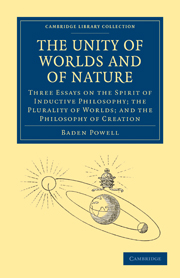 The Unity of Worlds and of Nature
The Unity of Worlds and of Nature Book contents
- Frontmatter
- PREFACE TO THE SECOND EDITION
- PREFACE TO THE FIRST EDITION
- Contents
- ESSAY I ON THE SPIRIT OF THE INDUCTIVE PHILOSOPHY
- ESSAY II ON THE UNITY OR PLURALITY OF WORLDS
- ESSAY III ON THE PHILOSOPHY OF CREATION
- INTRODUCTION: Nature of the proposed Inquiry
- I THE EVIDENCE DERIVED FROM GEOLOGY
- II THE EVIDENCE DERIVED FROM PHYSIOLOGY
- III GENERAL CONSIDERATIONS ARISING OUT OF THE PRECEDING EVIDENCE
- IV THE BEARING OF THE PRECEDING ARGUMENTS ON THE THEOLOGICAL VIEW OF CREATION
- APPENDIX
- ERRATA
IV - THE BEARING OF THE PRECEDING ARGUMENTS ON THE THEOLOGICAL VIEW OF CREATION
Published online by Cambridge University Press: 29 August 2010
- Frontmatter
- PREFACE TO THE SECOND EDITION
- PREFACE TO THE FIRST EDITION
- Contents
- ESSAY I ON THE SPIRIT OF THE INDUCTIVE PHILOSOPHY
- ESSAY II ON THE UNITY OR PLURALITY OF WORLDS
- ESSAY III ON THE PHILOSOPHY OF CREATION
- INTRODUCTION: Nature of the proposed Inquiry
- I THE EVIDENCE DERIVED FROM GEOLOGY
- II THE EVIDENCE DERIVED FROM PHYSIOLOGY
- III GENERAL CONSIDERATIONS ARISING OUT OF THE PRECEDING EVIDENCE
- IV THE BEARING OF THE PRECEDING ARGUMENTS ON THE THEOLOGICAL VIEW OF CREATION
- APPENDIX
- ERRATA
Summary
Theological view of the inquiry kept distinct
It was observed at the outset of this Essay, that the question of creation has distinctly a theological bearing; and it is no disparagement to such a view, that in the preceding sections I have treated the subject in a purely inductive and scientific light, and have purposely abstained from introducing any reference to those higher considerations, in order to lay a more secure basis for any such applications, as well as for meeting any objections alleged on religious grounds.
Prejudice against such speculations on religious grounds
Arising from misconception
It cannot be denied that any discussion of the question of Creation, or any attempt to trace the lations on religious probable history of the origin of the physical world, or of its organised productions, on merely scientific grounds, has been often regarded, especially by a certain class of minds, as having a tendency unfavourable to religion, and as being, in some degree, an intrusion into its province and an assumption of its office. Such impressions, however, appear to me to take their rise in the same common species of misconception of the relations in general between science and faith, which, in so many other instances, has resulted either in a lamentable antagonism and hostility, or in futile attempts to combine them in incongruous union, upon fallacious principles.
- Type
- Chapter
- Information
- The Unity of Worlds and of NatureThree Essays on the Spirit of Inductive Philosophy; the Plurality of Worlds; and the Philosophy of Creation, pp. 464 - 512Publisher: Cambridge University PressPrint publication year: 2009First published in: 1856
